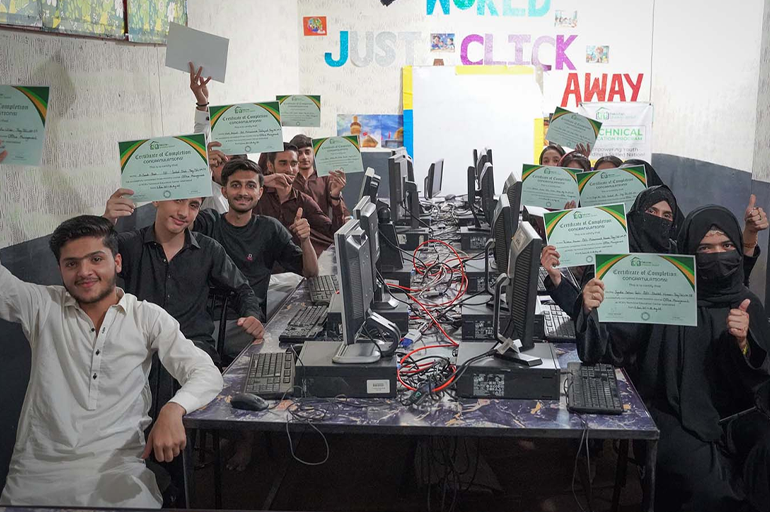Youth unemployment remains one of Pakistan’s most pressing challenges, especially as thousands of young people enter the workforce every year with limited practical skills. While traditional education plays an important role, it often fails to equip students with the hands-on expertise needed in today’s job market. This is where technical education steps in offering a pathway for young people to gain relevant skills, secure employment, and support long-term economic stability. But technical education doesn’t succeed in isolation. It requires collaboration between educational institutions, industries, government entities, and development organizations. By working together to modernize training systems, Pakistan can cultivate a generation of job-ready youth prepared to excel in a rapidly evolving labor landscape. The Current Landscape of Technical Education in Pakistan Overview of Technical Institutions Pakistan’s technical education system includes polytechnic institutes, trade schools, and vocational centers designed to prepare students for industry-based careers. While many institutions have the potential to produce highly skilled graduates, constraints such as outdated equipment, limited funding, and traditional teaching methods often hinder their effectiveness. Enrollment Trends Enrollment in technical fields has grown slowly but steadily, particularly among students seeking quicker pathways to employment. However, participation still represents a small portion of the youth population, and significant gender disparity remains. Many young women still hesitate to enter technical fields due to cultural norms, accessibility issues, and a lack of mentorship opportunities. Key Challenges Technical institutes frequently face shortages of qualified instructors and weak connections with industry employers. This disconnect often leaves students learning theory without opportunities to apply their skills. Without updated curricula and industry-aligned training, graduates may enter the workforce underprepared. Identifying Skills Gaps Among Youth Industry Needs Analysis Employers across Pakistan repeatedly highlight the gap between skills taught and skills required. Industries such as manufacturing, IT, agriculture, logistics, and renewable energy seek workers who can operate modern tools, understand safety standards, and solve problems independently. Unfortunately, many young job seekers lack exposure to real-world technologies. Balancing Soft and Hard Skills Employers don’t just want technical proficiency; they value communication, teamwork, and adaptability. A candidate may know how to operate machinery or code software, but without strong soft skills, they may struggle in collaborative environments. This blend of competencies is essential for long-term career growth. Youth Aspirations Many young Pakistanis aspire to careers in technology, engineering, digital services, or creative fields. Yet, they often lack clear pathways for achieving these aspirations. Awareness campaigns, career counseling, and accessible training opportunities are essential to guide youth toward viable and fulfilling career options. Collaborative Efforts: Building Stronger Links Between Education and Industry Effective Partnership Models In countries with strong technical education systems, institutions work hand-in-hand with industries to develop practical training frameworks. Similar partnerships in Pakistan between colleges, businesses, and NGOs show promising results. When industries help design curricula, provide equipment, or host students for training, graduates become far better prepared for employment. Internships and Apprenticeships Real-world learning experiences remain one of the most effective tools for preparing job-ready youth. Apprenticeships give students hands-on exposure, building confidence and competence. When young people train within companies, they gain insights into workplace expectations, professional behavior, and modern technology. Continuous Improvement Through Feedback Technical institutions must regularly consult employers and students to refine their programs. Feedback loops help ensure that training stays relevant and adaptive to changing market needs. Government’s Role in Strengthening Technical Education Policy Frameworks Supportive legislation can set the foundation for quality training systems. Policies that standardize curricula, encourage industry participation, and prioritize skills for economic development help create long-term impact. Funding and Resource Allocation Technical education requires investments in equipment, updated labs, and skilled instructors. Government funding—paired with private sector support—can modernize existing institutions and establish new training centers. Public–Private Partnerships When businesses collaborate with the public sector, training becomes more aligned with market needs. Such partnerships also improve job placement rates and give students a clear connection between education and employment. Engaging Youth: Awareness, Inclusion & Accessibility Outreach and Awareness Many young people simply don’t know the opportunities technical education can unlock. Awareness campaigns, community workshops, school visits, and social media campaigns can shift mindsets and encourage participation. Removing Barriers Scholarships, transport assistance, and flexible schedules can help students from low-income backgrounds access training opportunities. Reducing barriers ensures that ability not financial status determines future opportunities. Gender Inclusivity Empowering girls in technical fields strengthens families and communities. Mentorship programs, safe learning environments, and female-focused outreach can increase girls’ enrollment and broaden Pakistan’s talent pool. Measuring Impact and Preparing for the Future Key Performance Indicators Monitoring metrics such as skill competencies, job placement rates, and employer satisfaction ensures continuous progress. Graduate Employment Tracking Following up with graduates provides accurate insights into how well programs prepare students for the workforce. Looking Ahead Emerging fields like AI, automation, and renewable energy will reshape skill demands. Training systems must evolve to prepare youth for the jobs of tomorrow. Conclusion: Building a Skilled Future with Collective Effort Transforming technical education in Pakistan is essential to preparing a capable, job-ready youth population. By enhancing training systems, strengthening industry links, and expanding access to programs including vocational training programs in Pakistan, skill development for children, digital skills training for youth, and technical education for orphan children Pakistan can unlock the potential of its growing young population. As stakeholders work together to support technical education in Pakistan, organizations like Pakistan Children Relief (PAKCR) continue to play a vital role in empowering underserved youth with practical skills, confidence, and opportunities for a brighter future. Frequently Asked Questions What are the main challenges facing technical education in Pakistan? The main challenges include inadequate funding, outdated curricula, insufficient industry partnerships, and a lack of awareness among youth regarding available technical education opportunities. How can industries contribute to improving technical education? Industries can contribute by partnering with educational institutions to develop relevant curricula, providing internships and apprenticeships, and offering feedback on the skills required for the workforce. What role does the government play in enhancing technical education? The government plays a crucial role by creating


